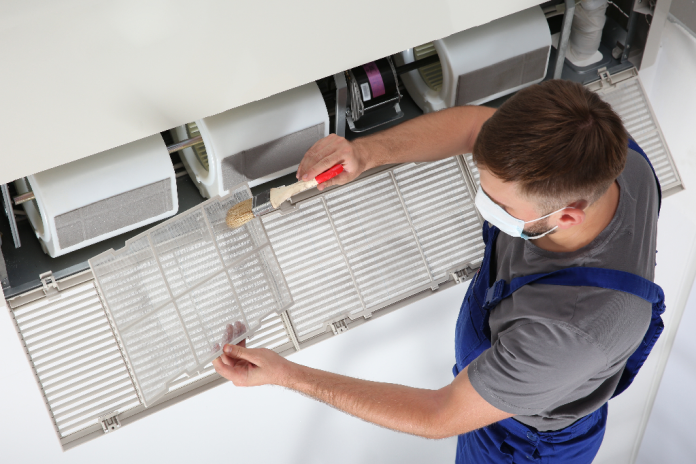Air filters play a crucial role in maintaining indoor air quality and protecting HVAC systems. Understanding the types, working mechanisms, and proper maintenance of air filters is essential for every homeowner. In this comprehensive guide, we will delve into the world of air filters, providing insights into their significance and functionality.
Introduction
To kickstart our journey into the realm of air filters, it’s essential to grasp their fundamental purpose. Air filters act as gatekeepers for the air circulating within your home, trapping particles and contaminants that could otherwise compromise the quality of the air you breathe.
-
Importance of Air Filters
Enhancing Indoor Air Quality – One of the primary functions of air filters is to improve indoor air quality. By capturing dust, pollen, pet dander, and other airborne particles, filters create a healthier living environment for you and your family.
Protecting HVAC Systems – Air filters act as the first line of defence for your HVAC (Heating, Ventilation, and Air Conditioning) system. They prevent debris from entering and damaging the system, ensuring its longevity and efficiency.
-
Types of Air Filters
Understanding the variety of air filters available is crucial in making an informed choice for your home.
Fibreglass Filters – Budget-friendly and disposable, fibreglass filters are the most common type. They capture larger particles but may not be as effective for smaller contaminants.
HEPA Filters – High-efficiency particulate Air (HEPA) filters are renowned for their exceptional filtration capabilities, removing microscopic particles and allergens.
Electrostatic Filters – These filters use static electricity to attract and capture particles, offering improved efficiency compared to traditional filters.
-
How Do Air Filters Work?
Now, let’s delve into the intricate working mechanisms that make air filters vital to indoor air quality management.
Mechanical Filtration – Mechanical filtration involves physically trapping particles as air passes through the filter. This is the primary method employed by most traditional filters.
Electrostatic Attraction – In electrostatic filtration, the filter carries an electric charge that attracts and captures particles. This method is particularly effective for smaller contaminants.
Activated Carbon Filtration – Activated carbon filters use a porous material to adsorb and neutralize odours and harmful gases in the air.
-
Choosing the Right Air Filter
Selecting the appropriate air filter for your home involves considering various factors.
Understanding MERV Ratings – MERV (Minimum Efficiency Reporting Value) ratings indicate a filter’s efficiency. Higher MERV ratings mean better filtration but may require more frequent replacements.
Considering Filter Material – Different filter materials offer varying levels of filtration. Understanding these materials helps in choosing a filter that suits your specific needs.
Proper Sizing – Ensuring the filter fits your HVAC system correctly is crucial for optimal performance. Refer to your system’s manual or consult with a professional to determine the right size.
-
Importance of Regular Replacement
Regularly replacing air filters is a key aspect of maintaining a healthy living space and efficient HVAC systems.
Preventing Airborne Contaminants – As filters accumulate particles, their efficiency diminishes. Regular replacement prevents the release of trapped contaminants back into the air.
Maintaining HVAC Efficiency – A clogged filter forces the HVAC system to work harder, leading to increased energy consumption and potential system malfunctions. Regular replacement ensures optimal efficiency.
-
DIY Air Filter Maintenance Tips
Ensuring your air filters function at their best requires some simple maintenance steps.
Cleaning vs. Replacement – While some filters are washable, others are disposable. Know your filter type and follow the recommended cleaning or replacement guidelines.
Recommended Replacement Schedule – Refer to your filter’s guidelines for the manufacturer’s recommended replacement schedule. Factors like pets, allergies, and local air quality can influence the frequency.
-
Common Misconceptions about Air Filters
Let’s debunk some common air filter myths to ensure you make informed decisions.
All Filters Are the Same – Filters differ significantly in their efficiency and intended use. Understanding these differences helps in selecting the right filter for your needs.
Lifetime Filters – Despite claims, no filter lasts forever. All filters need regular maintenance and eventual replacement to maintain effectiveness.
Air Filters Solve All Indoor Air Quality Issues – While crucial, air filters alone may not solve all indoor air quality problems. They are just one part of a comprehensive approach to maintaining a healthy home environment.
-
Benefits of Using High-Quality Air Filters
Investing in high-quality air filters like 20x30x1 air filters comes with various advantages for both your health and your wallet.
Health Benefits – Improved air quality reduces the risk of respiratory issues and allergies, promoting overall health and well-being.
Long-term Cost Savings – While high-quality filters might have a higher initial cost, their effectiveness and longevity can lead to significant savings in the long run.
-
Environmental Impact of Air Filters
Considering the environmental impact of air filters is crucial in our eco-conscious era.
Sustainable Options – Explore eco-friendly filter options made from recyclable materials to minimize environmental impact.
Proper Disposal Practices – Dispose of used filters responsibly. Some filters may be recyclable, and proper disposal helps reduce environmental harm.
-
Trends in Air Filtration Technology
Stay abreast of the latest innovations in air filtration technology for a more informed decision-making process.
Smart Air Filters – Technological advancements have led to the development of smart air filters that can be monitored and controlled remotely.
Eco-Friendly Innovations – Manufacturers are increasingly focusing on creating filters with minimal environmental impact, reflecting a growing trend towards sustainability.
Conclusion
In conclusion, this comprehensive guide has illuminated the crucial role of air filters and how they work. from enhancing indoor air quality to protecting HVAC systems, air filters serve as indispensable guardians of our living spaces. Understanding their various types, mechanisms, and the importance of regular maintenance empowers individuals to make informed choices for healthier homes. As we breathe easier, armed with knowledge about air filters, we embark on a journey towards creating environments that prioritise both well-being and the longevity of essential systems.













